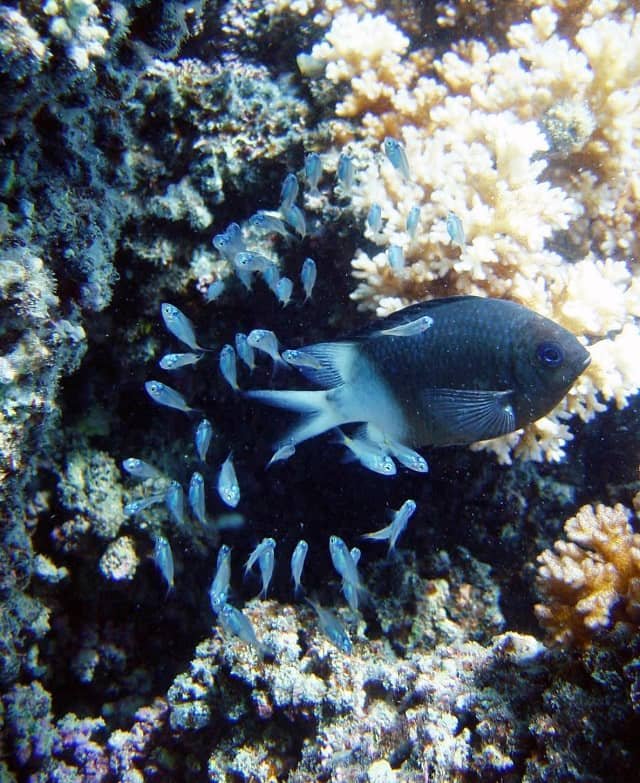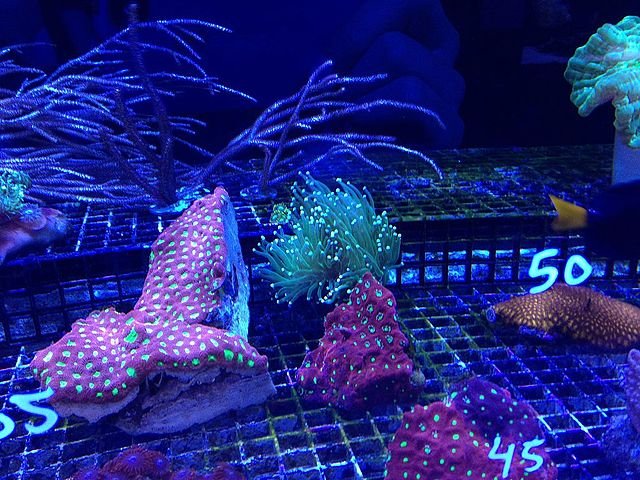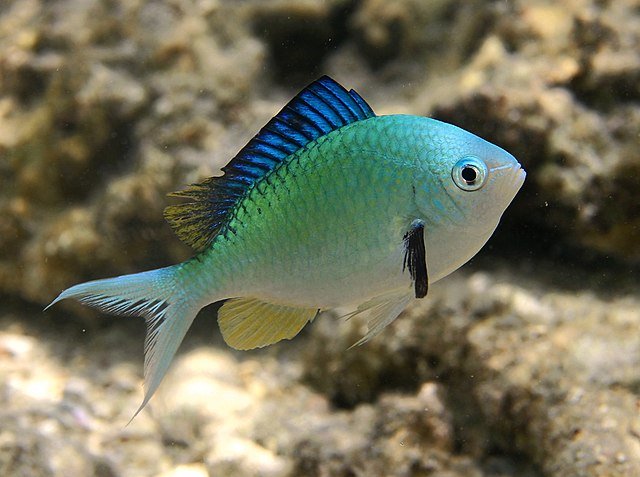
Coral reefs host a vast array of fish species, each with unique life histories and adaptations to survive in this complex ecosystem. A crucial aspect of a fish’s life cycle is the recruitment process, in which juvenile fish settle into the reef and face an array of predators and parasites. While predation rates are well-studied, the role of parasites in determining fish mortality remains poorly understood.
In a new study, researchers from The University of Queensland, the University of Miami, and the University of California explored the critical role of parental care in protecting juvenile fish from parasite-induced mortality.
The researchers uncovered a rare example of “great fish parenting” with a common coral reef species that actively protects its offspring by eating parasites.
The Spiny Chromis: A Model Species
The spiny chromis or damselfish (Acanthochromis polyacanthus) is a coral reef fish that exhibits a unique life history, lacking pelagic larvae but demonstrating parental care. The parents tend to benthic egg nests and protect the juveniles from predators and conspecifics until they reach approximately 55 mm in length. This species is an ideal model for studying the role of parental care in safeguarding juvenile fish against parasites.
Dr. Alexandra Grutter from The University of Queensland said the team identified that a species of damselfish cared for its offspring and enhanced their survival chances by consuming parasitic gnathiid isopods.
“In the marine environment, fish egg care is common, but care for small larval fish after they hatch is uncommon,” Dr. Grutter said.
“In most cases, larvae leave the reef for the open ocean.
“But remarkably, the offspring of the spiny damselfish chromis in the western Pacific Ocean never leave the reef and are cared for by both parents.”
Gnathiid Isopods: The Invisible Enemy
Gnathiid isopods (Gnathiidae) are the most common ectoparasites of fish on coral reefs. They feed on fish blood, imposing significant costs on their hosts. While they generally pose a non-lethal threat to larger individuals, gnathiid parasitism of newly recruited juveniles can result in significant survival costs. Many fish species engage in parasite removal services, but these “cleaner fish” tend to prefer larger clients.
Stay Always Informed
Join our communities to instantly receive the most important news, reports, and analysis from the aquaculture industry.
Parental Care as a Defensive Behavior
The study found that the presence of parents significantly increases the survival rate of spiny chromis juveniles exposed to gnathiids. In laboratory experiments, the researchers discovered that the survival rate of newly hatched juveniles was higher when parents were present (77%) compared to when parents were absent (25%).
Analysis of adult feces in both field and laboratory settings indicated that adults consume gnathiids, suggesting that parental care plays a key role in reducing parasite-induced mortality.
The researchers found that parent fish actively eat gnathiids, which are common reef parasites that briefly feed on their host’s blood before leaving, much like mosquitoes.
“From our previous research, we know that gnathiids are particularly harmful to young fish, reducing their swimming ability, competitiveness, escape response, aerobic performance, and overall survival,” Dr. Grutter said.
“Therefore, this is a fascinating example of excellent fish parenting.”
Implications for Coral Reef Fish Communities
The findings highlight the overlooked role of parasites as a major source of juvenile fish mortality on coral reefs and the composition of reef fish communities. The presence of parental care in certain species, such as the spiny chromis, can significantly reduce parasite-induced mortality, enabling juveniles to survive and thrive on the reef. This has important implications for understanding the complex interactions between predators, parasites, and hosts in coral reef ecosystems.
Conclusion
In conclusion, the study demonstrates the critical role of parental care in protecting juvenile fish from parasite-induced mortality. By consuming gnathiids, parents can significantly reduce the risk of mortality for their offspring, allowing them to survive and thrive on the reef. This underscores the importance of considering the role of parasites in determining fish mortality and the composition of coral reef fish communities.
Further research is needed to understand the broader implications of this finding for coral reef ecosystems.
Contact
Alexandra S. Grutter
School of the Environment, The University of Queensland
St Lucia, QLD 4072, Australia
Email: a.grutter@uq.edu.au
Reference (open access)
Grutter Alexandra S., Blomberg Simone P., Duong Berilin, Fargher Bronwyn E., Feeney William E., McCormick Mark I., Nicholson Matthew D., Sikkel Paul C., Warner Robert R. and Kuris Armand M. 2024. Parental care reduces parasite-induced mortality in a coral reef fish. Proc. R. Soc. B.29120241966
http://doi.org/10.1098/rspb.2024.1966
Editor at the digital magazine AquaHoy. He holds a degree in Aquaculture Biology from the National University of Santa (UNS) and a Master’s degree in Science and Innovation Management from the Polytechnic University of Valencia, with postgraduate diplomas in Business Innovation and Innovation Management. He possesses extensive experience in the aquaculture and fisheries sector, having led the Fisheries Innovation Unit of the National Program for Innovation in Fisheries and Aquaculture (PNIPA). He has served as a senior consultant in technology watch, an innovation project formulator and advisor, and a lecturer at UNS. He is a member of the Peruvian College of Biologists and was recognized by the World Aquaculture Society (WAS) in 2016 for his contribution to aquaculture.




